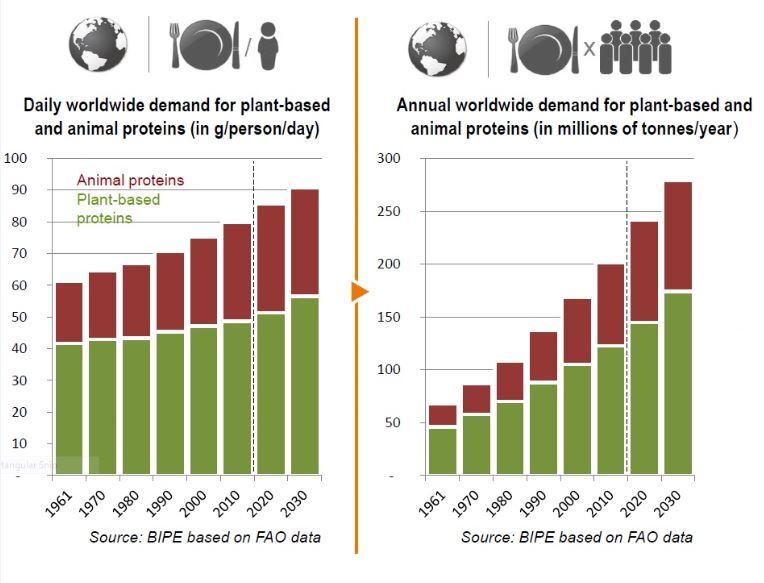While meat consumption is on the rise in much of the developing world, it is beginning to fall in developed economies. In fact, average meat intakes in Western Europe fell by 9% from 1990 to 2009, FAOSTAT figures show.
But demand for meat is set to tail off sharply from 2020 because of a major shortage of oilseed meal for feed, claims a report from Paris-based consultancy BIPE and Sofiprotéol, which represents the French vegetable oils and proteins sector. And in wealthy nations, it argues that falling meat consumption is also part of a wider dietary transition.
“Ensuring the availability of the protein supply while protecting resources means increasing the crop yield on a sustainable basis,” said Sofiprotéol deputy CEO Michel Boucly.
Two dietary transitions
The report suggests that regions like Sub-Saharan Africa, North Africa, the Middle East and India are just at the beginning of a first dietary transition, characterised by a shift toward more protein, initially from plant sources and then from animal sources – particularly meat. Plant protein sources increasingly are replaced by animal protein sources, and demand for oils also increases.
Developed economies went through this first transition during the 20th century, and now are entering a second transition, the report’s authors say.
“The second dietary transition is characterised by an increase in the percentage of plant protein sources, either by reducing the level of demand for animal proteins, as seen in France over the past ten years, or increased consumption of plant proteins, as is currently the case in North America,” they wrote, adding that vegetable oil demand also falls during this phase.
Health awareness
“This second transition is the result of societal and environmental factors, such as growing awareness of the importance of a balanced diet.”

Indeed, there is a mounting body of research highlighting the health benefits of a vegetarian diet (or even a reduced-meat diet), including lower BMI, increased fibre intake, and lower risk of cardiovascular disease, cancer and diabetes. And researchers increasingly are asking questions about how to address the dual issues of health and environmental sustainability through dietary patterns.
According to the BIPE-Sofiprotéol report, demand for plant-based proteins from 2010 to 2030 will grow by 43%, driven by Sub-Saharan Africa and India, which are likely to be at the beginning of the first transition phase during this period. Animal protein demand, meanwhile, will grow by a third – and a third of that growth is expected to come from China.
However, dietary transitions only account for 25% of the increase in meat demand, with the rest coming from population growth, the report predicts.
To meet the growing demand for plant protein – for both human and animal consumption – Sofiprotéol’s Boucly said: “It is essential to develop seed research, to encourage the plant health and nutrition businesses, and to develop innovative crop systems. First and foremost, however, it is the sustainable structuring of agricultural sectors that will enable us to meet the challenges that we are facing.”
